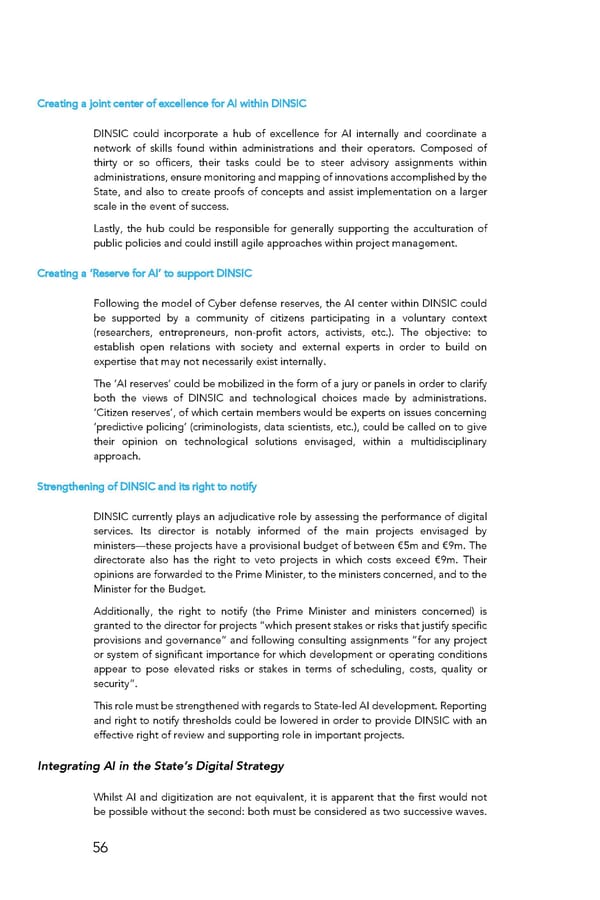Creating a joint center of excellence for AI within DINSIC DINSIC could incorporate a hub of excellence for AI internally and coordinate a network of skills found within administrations and their operators. Composed of thirty or so officers, their tasks could be to steer advisory assignments within administrations, ensure monitoring and mapping of innovations accomplished by the State, and also to create proofs of concepts and assist implementation on a larger scale in the event of success. Lastly, the hub could be responsible for generally supporting the acculturation of public policies and could instill agile approaches within project management. Creating a ‘Reserve for AI’ to support DINSIC Following the model of Cyber defense reserves, the AI center within DINSIC could be supported by a community of citizens participating in a voluntary context (researchers, entrepreneurs, non-profit actors, activists, etc.). The objective: to establish open relations with society and external experts in order to build on expertise that may not necessarily exist internally. The ‘AI reserves’ could be mobilized in the form of a jury or panels in order to clarify both the views of DINSIC and technological choices made by administrations. ‘Citizen reserves’, of which certain members would be experts on issues concerning ‘predictive policing’ (criminologists, data scientists, etc.), could be called on to give their opinion on technological solutions envisaged, within a multidisciplinary approach. Strengthening of DINSIC and its right to notify DINSIC currently plays an adjudicative role by assessing the performance of digital services. Its director is notably informed of the main projects envisaged by ministers—these projects have a provisional budget of between €5m and €9m. The directorate also has the right to veto projects in which costs exceed €9m. Their opinions are forwarded to the Prime Minister, to the ministers concerned, and to the Minister for the Budget. Additionally, the right to notify (the Prime Minister and ministers concerned) is granted to the director for projects “which present stakes or risks that justify specific provisions and governance” and following consulting assignments “for any project or system of significant importance for which development or operating conditions appear to pose elevated risks or stakes in terms of scheduling, costs, quality or security”. This role must be strengthened with regards to State-led AI development. Reporting and right to notify thresholds could be lowered in order to provide DINSIC with an effective right of review and supporting role in important projects. Integrating AI in the State’s Digital Strategy Whilst AI and digitization are not equivalent, it is apparent that the first would not be possible without the second: both must be considered as two successive waves. 56
 For a Meaningful AI - Report Page 56 Page 58
For a Meaningful AI - Report Page 56 Page 58